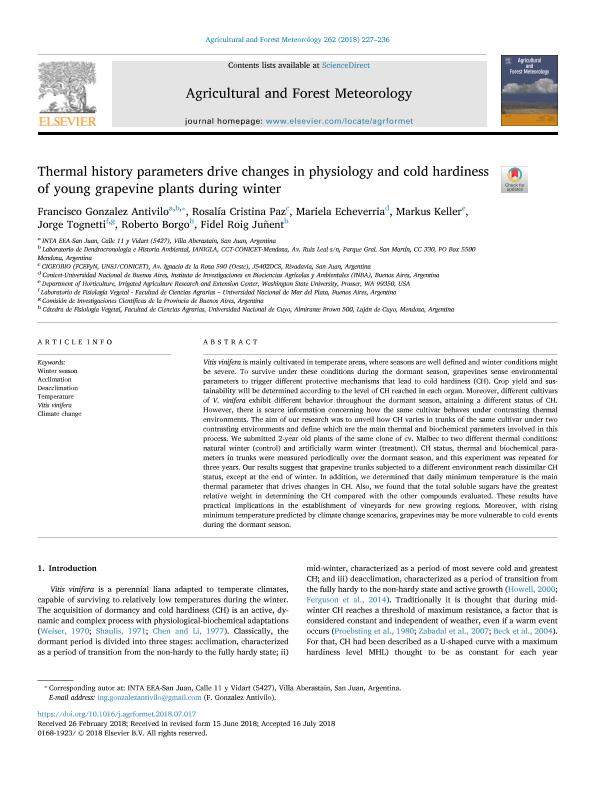Artículo
Thermal history parameters drive changes in physiology and cold hardiness of young grapevine plants during winter
Gonzalez Antivilo, Francisco Alberto ; Paz, Rosalia Cristina
; Paz, Rosalia Cristina ; Echeverria, Mariela
; Echeverria, Mariela ; Keller, Markus; Tognetti, Jorge Alberto; Borgo, Roberto; Roig Junent, Fidel Alejandro
; Keller, Markus; Tognetti, Jorge Alberto; Borgo, Roberto; Roig Junent, Fidel Alejandro
 ; Paz, Rosalia Cristina
; Paz, Rosalia Cristina ; Echeverria, Mariela
; Echeverria, Mariela ; Keller, Markus; Tognetti, Jorge Alberto; Borgo, Roberto; Roig Junent, Fidel Alejandro
; Keller, Markus; Tognetti, Jorge Alberto; Borgo, Roberto; Roig Junent, Fidel Alejandro
Fecha de publicación:
11/2018
Editorial:
Elsevier Science
Revista:
Agricultural And Forest Meteorology
ISSN:
0168-1923
Idioma:
Inglés
Tipo de recurso:
Artículo publicado
Clasificación temática:
Resumen
Vitis vinifera is mainly cultivated in temperate areas, where seasons are well defined and winter conditions might be severe. To survive under these conditions during the dormant season, grapevines sense environmental parameters to trigger different protective mechanisms that lead to cold hardiness (CH). Crop yield and sustainability will be determined according to the level of CH reached in each organ. Moreover, different cultivars of V. vinifera exhibit different behavior throughout the dormant season, attaining a different status of CH. However, there is scarce information concerning how the same cultivar behaves under contrasting thermal environments. The aim of our research was to unveil how CH varies in trunks of the same cultivar under two contrasting environments and define which are the main thermal and biochemical parameters involved in this process. We submitted 2-year old plants of the same clone of cv. Malbec to two different thermal conditions: natural winter (control) and artificially warm winter (treatment). CH status, thermal and biochemical parameters in trunks were measured periodically over the dormant season, and this experiment was repeated for three years. Our results suggest that grapevine trunks subjected to a different environment reach dissimilar CH status, except at the end of winter. In addition, we determined that daily minimum temperature is the main thermal parameter that drives changes in CH. Also, we found that the total soluble sugars have the greatest relative weight in determining the CH compared with the other compounds evaluated. These results have practical implications in the establishment of vineyards for new growing regions. Moreover, with rising minimum temperature predicted by climate change scenarios, grapevines may be more vulnerable to cold events during the dormant season.
Archivos asociados
Licencia
Identificadores
Colecciones
Articulos(IANIGLA)
Articulos de INST. ARG. DE NIVOLOGIA, GLACIOLOGIA Y CS. AMBIENT
Articulos de INST. ARG. DE NIVOLOGIA, GLACIOLOGIA Y CS. AMBIENT
Articulos(INBA)
Articulos de INST.DE INVEST. EN BIOCIENCIAS AGRICOLAS Y AMBIENTALES
Articulos de INST.DE INVEST. EN BIOCIENCIAS AGRICOLAS Y AMBIENTALES
Citación
Gonzalez Antivilo, Francisco Alberto; Paz, Rosalia Cristina; Echeverria, Mariela; Keller, Markus; Tognetti, Jorge Alberto; et al.; Thermal history parameters drive changes in physiology and cold hardiness of young grapevine plants during winter; Elsevier Science; Agricultural And Forest Meteorology; 262; 11-2018; 227-236
Compartir
Altmétricas



